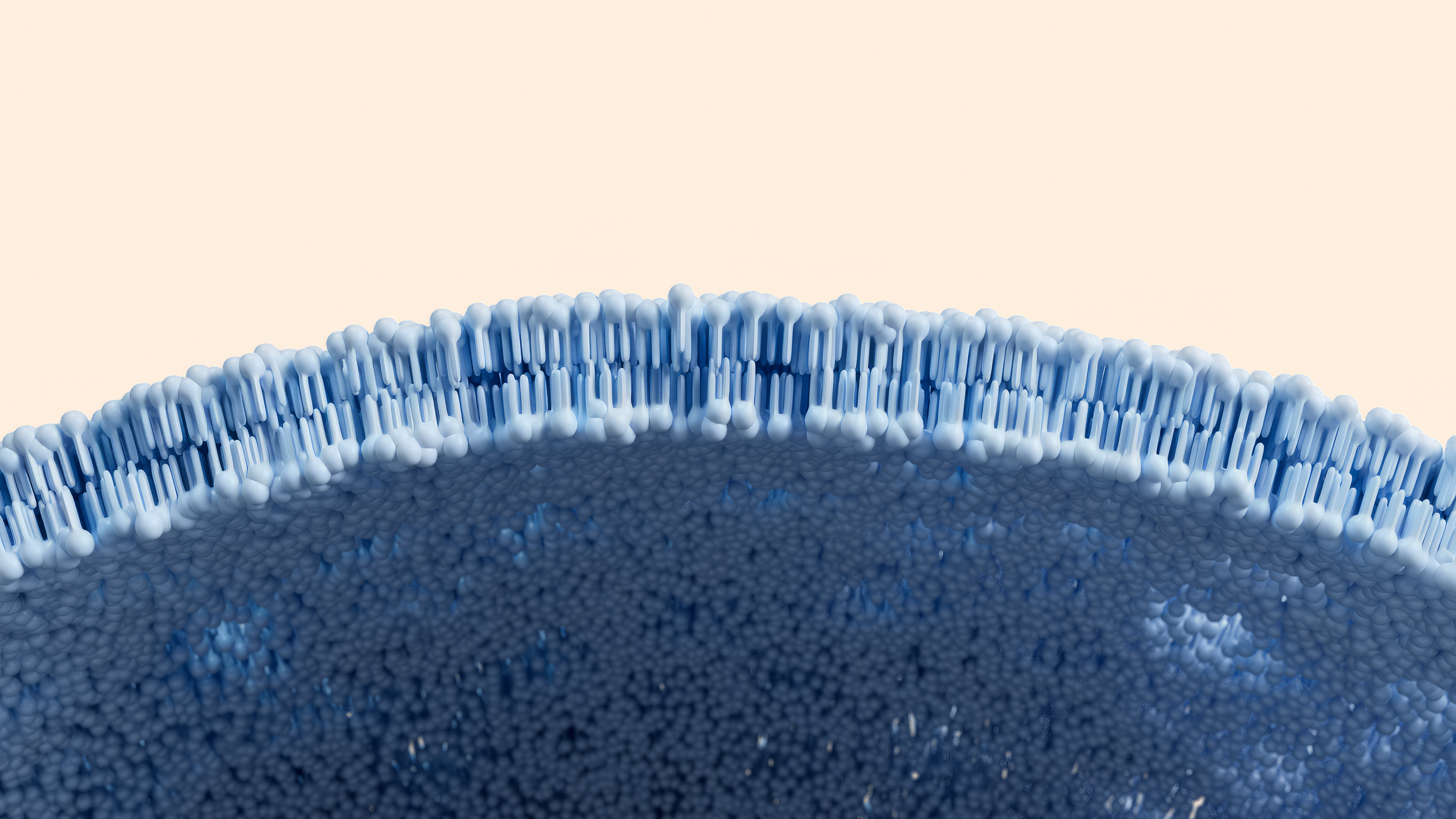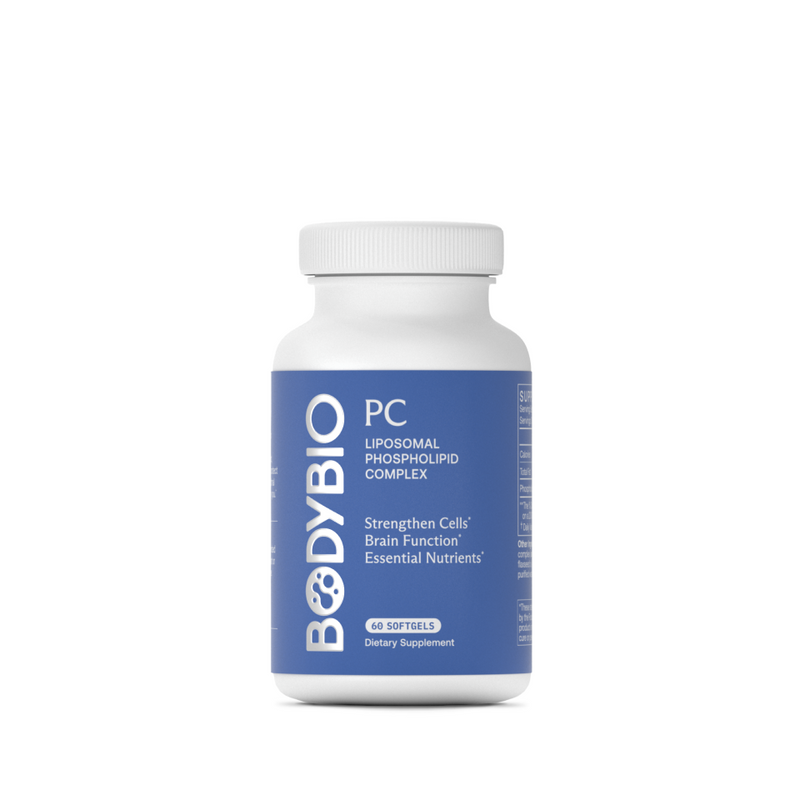The Importance of the Cell Membrane & Cell Repair
Authors:

Dr. Thomas Wnorowski
PhD, CNCC Research Director, BodyBio & Biomedical Nutritionist
Key Takeaways:
Key Points:
- The cell membrane works to keep free radicals and toxins out of the cell itself — while carefully transporting essential nutrients into the cell for optimal health and vitality.
- As we are exposed to more toxins and pollution in our environment, cell membrane damage is becoming more common and can contribute to neurodegenerative disorders, thyroid issues, and autoimmune diseases. If you care about your health, then you must care about your cell membranes.
- Can the cell membrane repair itself? Yes! With a few essential nutrients like antioxidants, phospholipids, and fatty acids, you’ll be well on your way to repairing and supporting healthy cell membranes throughout your body.
How to Optimize Cellular Repair in the Modern World
One thing we can always count on our membranes for is protection.
Membranes are thin layers of tissue that act as gatekeepers — protecting essential organs and systems in the body (like the immune system, lungs, and heart) from infection and free radicals.
The cell membrane is no different. Its job is to protect the inner workings of the cell, so essential nutrients stay in and infections keep out.
With heightened levels of pollution, chemicals, and even physical and emotional trauma around us, we believe it’s more important than ever to know how to protect and repair our cell membranes.
Table of Contents:
- The Importance of the Cell Membrane — A Brief Overview
- Cell Membrane Structure and Function
- What Happens When We Damage Our Cell Membranes?
- What Can Cause Damage to the Cell Membrane?
- Can the Cell Membrane Repair Itself? How to Reverse Cell Membrane Damage
- Why We Have to Proactively Protect Our Cells
The Importance of the Cell Membrane — A Brief Overview
Let’s get down to the nitty-gritty. What does the cell membrane actually do and how does it impact your daily life?
As you go about your day, your cell membranes are constantly filtering out free radicals and providing nourishment to keep the inside of the cell properly functioning. The membrane itself is made up of lipids, proteins, and carbohydrates that all have an essential role to play.
Cell Membrane Structure and Function
The cell membrane is found in every living thing (not just in humans). It’s also called the plasma membrane and it consists of a lipid bilayer that carefully brings nutrients in and filters toxins and waste out. Think of it like the moat around a castle. The moat protects the castle from invaders, and selectively allows certain things in (via a drawbridge).
Phospholipids
The lipid bilayer is made up of phosphatidylcholine (PC), phosphatidylethanolamine (PE), phosphatidylinositol (PI), phosphatidic acid (PA), cardiolipin (CL), sphingomyelin (SM) and phosphatidylserine (PS).These various phospholipids carry a positive or negative charge and help regulate what passes into and out of the cell.
Essential Fatty Acids
Fatty acids are infused in all phospholipids and cell membranes. They’re important for cell signaling and gene expression. Essential fatty acids cannot be made in the body, however, so the cell relies wholly on diet to remain functional. As our food becomes more and more processed, we’re slowly pushing omega 3’s and healthy omega 6’s out of our diet, which directly impacts cell membrane health.
Proteins in the Cell Membrane
Embedded within the lipid bilayer, we find proteins: peripheral proteins and integral proteins, to be exact. These play a vital role in cell membrane health and function, as they provide channels for nutrients to pass through and shift small ions across the membrane. Peripheral proteins primarily provide structural support, helping cells bond to each other.
Minerals for Cell Membrane Health
The cell membrane regularly uses the positively charged minerals calcium, potassium, and magnesium. These minerals are essential to moving fluid in and out of the cell itself — boosting hydration and energy in the body. (Hence their name, electrolytes!) Especially if your body is in a chronic state of stress, these minerals may be depleted. Eventually, mineral depletion makes its way down to the cell and can impact cell membrane health.
What Happens When We Damage Our Cell Membranes?
Studies show that damage to the cell membrane puts us at higher risk for degenerative diseases, autoimmune diseases, and thyroid issues. So taking care of our cell membrane health is a big deal!
Even mild cell damage disrupts the cellular process — allowing toxins to enter freely. In more extreme cases, the damage incurred may be too much for the cell. In this case, the cell collapses and dies. It’s normal for cells to die and regenerate — this is the process of life — but when too many of our cells are sick and damaged, we run into chronic disease.
But don’t despair yet — most cell membrane damage can be fixed! We’ll get into that in just a minute. But first…
What Can Cause Damage to the Cell Membrane?
There are a number of outside influences that could put you at risk for “leaky” cell membranes. Sometimes, it’s one traumatic event that impacts the body and starts a chain reaction of cell damage — and other times it’s the culmination of a few different factors.
Physical Trauma
Alongside physical injury, radiation, exposure to extreme temperatures, electric shock, and ultraviolet exposure could all put you at risk for cell membrane damage. Our bodies simply aren’t built to experience these kinds of environmental extremes, and mass cell membrane damage is a common result of exposure.
Chemicals and Environmental Toxins
Pollution, toxic mold, and exposure to noxious chemicals (in our air and water supply) can greatly impact our cell membrane health. If you’ve been exposed at a high level to any of these environmental toxins, you know firsthand the toll it’s taken on your health.
However, most of us are receiving low levels of these environmental toxins every day and are relatively unaware of it. This low-level exposure is where we can run into chronic health issues over time and why we need to do the best we can to create a healthy environment in our homes and protect ourselves when we venture out into the world.
Common signs of low-level exposure to these toxins are less energy, more allergies, and a leaky gut. These may be the physical manifestations of a deeper issue: cell membrane damage.
Infection and Pathogens
Hidden infections like Lyme disease, parasites, and chronic viral infections can have a long-term impact on your cellular health — simply because they put your body in a deficit. When your immune system is fighting off a pathogen, it’s all hands on deck. Which, long term, could mean the cell membrane suffers. Pathogens also release toxins and waste of their own, adding to the burden on your cells.
Can the Cell Membrane Repair Itself? How to Reverse Cell Membrane Damage
Even if you know you’ve experienced damage to your cell membranes, healing is possible. Your body knows how to use its resources to protect and repair your cells. Here are a few nutrients you can use to jumpstart the healing process:
Phospholipids for Cell Membrane Health
Phospholipids are the cell membrane's secret weapon. Since the cell membrane bilayer is made up of phospholipids, replenishing your body’s storage of them is essential for reversing cell membrane damage. We created the do-it-all, ultimate phospholipid supplement, otherwise known as BodyBio PC.
By rebuilding the cell membrane, the cell itself is now free to function optimally, improving your energy, mood, hormones, and more.
Essential Fatty Acid Supplements
Typically, we associate essential fatty acids with brain health — but they’re just as essential for cell membrane repair, too. Fatty acids help to make up the cell membrane itself, and cannot be made inside the body. Getting an ample dose in our diets is essential to promoting cell membrane health in the modern world.
Protein and Amino Acid Supplements
The building blocks of the cell and cell membrane, protein is necessary for a healthy and holistic approach to cellular wellness. By adding protein and amino acids to your diet, you can help to strengthen cell membrane structure. Proteins also keep electrically-charged ions moving across the cell membrane — which in turn, aids the cell membrane filtering system.
A Healthy Dose of Antioxidants
If you’ve ever researched cellular health, you know antioxidants are a powerhouse among nutrients. While the cell membrane is meant to keep free radicals out of the cell, antioxidants may be able to actually eliminate them from the body. They’re affectionately called “free radical scavengers” since they target and neutralize free radicals before they have a chance to even reach the cell.
If you know you have cell membrane damage, antioxidants are your new best friend. They can give your cells a break from free radicals while they work to rebuild and repair themselves.
The best way to get a healthy dose of antioxidants is through food! Enjoy regular servings of colorful fruits and veggies, like blueberries, avocados, and broccoli.
Why We Have to Proactively Protect Our Cells
Think about it: we are exposed to more threats to our cellular health now than at any other time in human history. Pollution, chemical spills, high stress, contaminated drinking water, pesticides, volatile organic compounds, EMF radiation, ultraviolet rays, and that’s just the tip of the iceberg.
We’ve reached the point that if we don’t take action to protect ourselves on the cellular level, an outcome such as neurodegenerative disease, thyroid dysfunction, or poor gut health is almost guaranteed.
Our bodies are incredibly resourceful and adaptable — and we know they’ll rise to the challenge of meeting these daily threats head-on. But they need support. We believe it’s essential to aid hardworking cells with proper nutrients and cellular building blocks so they can function optimally.
Phospholipids, essential fatty acids, and antioxidants are slowly becoming obsolete in diets that rely on heavily processed foods. But even whole foods diets may be lacking in one or more of these nutritional categories. The more you can do now to ensure these nutrients stay in your diet and in your body, the happier your cells will be.
The Best Phospholipid Supplement for Cell Membrane Health (Backed by Science!)
Maldonado, P. D., Chánez-Cárdenas, M. E., & Fernández-López, A. (2018). Mechanisms of Cell Damage in Neurological Diseases and Putative Neuroprotective Strategies. Oxidative medicine and cellular longevity, 2018, 9784319. https://doi.org/10.1155/2018/9784319
Miller, M. A., & Zachary, J. F. (2017). Mechanisms and Morphology of Cellular Injury, Adaptation, and Death. Pathologic Basis of Veterinary Disease, 2–43.e19. https://doi.org/10.1016/B978-0-323-35775-3.00001-1
Surette M. E. (2008). The science behind dietary omega-3 fatty acids. CMAJ : Canadian Medical Association journal = journal de l'Association medicale canadienne, 178(2), 177–180. https://doi.org/10.1503/cmaj.071356
Lobo, V., Patil, A., Phatak, A., & Chandra, N. (2010). Free radicals, antioxidants and functional foods: Impact on human health. Pharmacognosy reviews, 4(8), 118–126. https://doi.org/10.4103/0973-7847.70902

